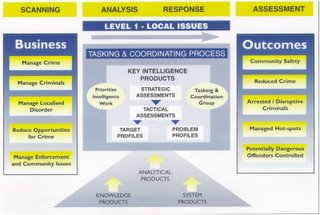
Blogger "PC Copperfield" went public in Monday's Panorama programme — he is Stuart Davidson, formerly of Staffordshire Police. Sadly, this bobby with a powerful BS detector is leaving us for Canada, where apparently the mediocracy level in the police force has not yet advanced as far as it has in Britain. I hope we're not going to start getting a public sector common sense drain, to parallel our academic brain drain.
I like these two posts from his blog. The first one illustrates the 1+1=2 type of management course which many workers, particularly those from the public sector, are subjected to these days, and which helps to mop up much of their time.
28 November 2005 I'd like to think that the figure on the left was secret and that I have revealed something that is of vital importance in the war on crime. Sadly, it probably isn't.
I'd like to think that the figure on the left was secret and that I have revealed something that is of vital importance in the war on crime. Sadly, it probably isn't.
As my CI, who incidentally has degrees in Chemistry and Oceanography and a PhD in Biology, points out: it's clearly nonsense.
The diagram is from Lancashire Police and purports to show the relationship between Problem Oriented Policing and the National Intelligence Model (NIM). For me though, most of the problems in policing today are encompassed in the diagram, which is almost beyond satire.
There are armies of people responsible for producing these diagrams and there are similar battalions responsible for the things shown in the diagram; things like "Tasking and Coordination", "Intelligence Work", "Strategic Assessments" and developing "Target Profiles" and "Problem Profiles". It always makes me snigger when these schemes are unveiled to shifts of two or three people: "Hang on, if you're doing community safety and I'm doing managed hotspots, who's doing the police work?"
The second post lucidly makes the core point of the Panorama programme: that police officers, like many other public sector workers, are now driven primarily by various government-set targets which supposedly maintain efficiency in the absence of market forces, but which mostly result in mere box-ticking behaviour.
26 April 2007
I’m all for measuring performance, after all, you might hope that having the police around would mean there was less crime rather than more, and we could measure that. You might also hope that where a crime has occurred, we would solve it.
The problem is that police forces are bureaucratic entities that depend upon “statistical significance” for their continued success. Those in charge don’t really depend upon the approval of local people for their salaries, they look instead to London and the Home Office. The Home Office judges police forces on one single statistic: how many people do we charge or caution.
The main problem with using the detection rate to measure performance is that it relies on people committing crimes first. The advantage for the bureaucrat is that it can be easily measured and a whole load of targets set. It all rather reminds me of the “body count” in the Vietnam War, when the US set great store by how many enemy they had killed, while all the time they were actually losing the war. Could it possibly be that even if we actually meet the all crime detection rate target, the public won’t feel the slightest bit safer?
Stuart also has a book out, Wasting Police Time. Well done for speaking out. Now could someone working in 'child protection' please do the honourable thing and follow his example, so we can get an inside view of that particular can of worms?

1 comment:
It would seem that Mr. Davidson's experience of the law enforcement system (we can hardly call it a justice system) would mirror my own experience of the indoctrination system (we can hardly call it an education system).
Meanngingless buzzwords, endless targets, incomprehensible diagrams, monthly fads, such a devotion of resources towards ensuring that everything except the job at hand was done that one might think it took careful planning and orchestration to make such a mess. Perhaps that's the actually the truth of it.
Post a Comment